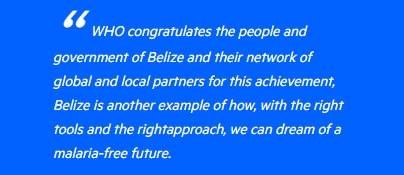
Wednesday 21 June 2023 – Today, Belize has been certified malaria-free by the World Health Organziation (WHO), becoming the second country in Central America to be granted malaria-free status.
It has become the 43rd country to achieve malaria-free certification worldwide and the 25th country to eliminate malaria since 2000. The country has sustained its commitment to end malaria since the mid-1980s when thousands of malaria cases were recorded each year.
Globally, increasingly more countries are approaching malaria elimination. According to the World Malaria Report 2022, 46 malaria-endemic countries have fewer than 10,000 indigenous malaria cases. WHO’s E-2025 initiative has also identified 25 countries within reach of achieving zero cases of malaria between 2021-25.
Earlier this year, the World Health Organization (WHO) certified Azerbaijan and Tajikistan for eliminating malaria in their territories. The certification follows a sustained, century-long effort to stamp out the disease by the two countries. Belize is the 3rd country to be certified this year.
Belize maintained zero indigenous malaria cases for more than three consecutive years, with the last case of P. vivax malaria reported in December 2018. The country has not reported any cases of P. falciparum malaria since 2007.

said Dr Tedros Adhanom Ghebreyesus, WHO Director-General.
Belize belongs to the Commonwealth, which committed to working towards ending malaria across its membership by 2030 at last year’s Heads of Government meeting. This commitment came just after the Kigali Summit on Malaria and NTDs, presided over by the Chair-in-office of the Commonwealth, His Excellency President Kagame of the Government of the Republic of Rwanda. Despite significant progress in many countries, progress in the highest burden countries of the Commonwealth has slowed in recent years. Belize’s leadership in demonstrating that elimination is possible against this backdrop is encouraging for all Commonwealth leaders.
Dr Corine Karema, Interim CEO of the RBM Partnership to End Malaria,comments,
“Belize’s malaria-free certification is a testament to the country’s ongoing dedication to eliminating malaria for half a century. This is a fantastic achievement for both the country and the wider region and demonstrates the crucial importance of country ownership and leadership to end malaria, sustained disease surveillance, multisectoral approach, and cross-border collaboration.“Belize's commendable achievement proves that ending malaria today is feasible and possible with the right resources and political commitment. Other countries in the region and over the world can learn from their experience.”
“Despite this, half the world’s population still lives at risk of dying from a mosquito bite, and countries face a significant shortfall in malaria resources. There is an urgent call to target existing malaria resources to maximise impact and protect the most vulnerable. Countries that have recently achieved or are approaching malaria elimination status must continue to be supported with the resources they need to prevent a resurgence in the disease.”
Belize is now implementing a plan to prevent the reintroduction of malaria, continuing to invest in surveillance, improved case management and vector control intervention in high-risk areas, cross-border and multisectoral collaboration, health worker training, and public awareness campaigns. “Today, we celebrate the investment and perseverance of the Belize government, vector control personnel, frontline health workers, and local communities who have diligently worked to wipe out malaria – a disease that was once widespread throughout the country,” adds Margaret Reilly McDonnell, Executive Director of the UN Foundation’s United to Beat Malaria campaign. “Belize’s success should inspire us all to act with renewed urgency to achieve a malaria-free future for the Americas and the world.”
In recent years, malaria cases and deaths in the highest burden countries have increased due to a funding plateau, biological threats, population growth, and competing financial and health priorities. The RBM Partnership to End Malaria urges countries and partners around the world to urgently scale up investments, innovation, and implementation of malaria programmes to accelerate progress against the disease.
